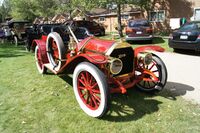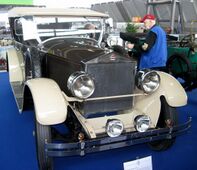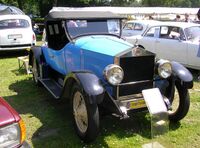Moon Motor Car
Topic: Company
 From HandWiki - Reading time: 4 min
From HandWiki - Reading time: 4 min
 The Ideal American Car | |
| Type | Automobile Manufacturing |
|---|---|
| Industry | Automotive industry |
| Fate | ceased trading |
| Founded | 1905 |
| Founder | Joseph W. Moon |
| Defunct | 1930 |
| Headquarters | St. Louis, Missouri , |
Key people | Joseph W. Moon, Stewart MacDonald, W.D. Hemenway |
| Products | Vehicles Automotive parts |
| Brands | Moon, Diana, Windsor |
Production output | 59,485 (1905-1930) |

Moon Motor Car Company (1905 – 1930) was an American automobile company that was located in St. Louis, Missouri. The company had a venerable reputation among the buying public, as it was known for fully assembled, easily affordable mid-level cars using high-quality parts. Often this meant the manufacturing process required more human intervention, leading to operating losses. The company was founded by carriage maker Joseph W. Moon.[1] Moon produced both cars and trucks.[1]
History
The first Moon, Model A was shown at the New York Automobile Show in January 1906.[2] It was a four-cylinder Rutenber engined car. In 1906 former Peerless engineer Louis P. Mooers joined Moon. Mooers designed a 4-cylinder overhead camshaft engine and with a four-speed transmission and aluminum bodywork, the Moon was a luxury car at $3,000 (equivalent to $101,239 in 2024). In 1908 Moons were sold in the eastern United States using the Hol-Tan name.[2]
By 1910 more mid-priced cars in the $1,500 to $2,000 range that were competitive with Buick and Oldsmobile, became more common.[3][2] In 1916 Moon was using six-cylinder engines exclusively and in 1919 introduced their Parthenon style radiator. Joseph Moon died in 1919 and was succeeded by his son-in-law and Vice President Stewart McDonald.[2] The St. Louis management included officers Stewart McDonald; W.D. Hemenway; A.F. Moberly; Stanley Moon; E.F. Nelson; C.W.A. Voge. Moon automobiles could get custom coachwork from designers such as Pullman, Rubay and Murray.[2] Moon exports increased in the 1920s when they reported they were delivering to 47 different countries.[2]
Beginning in 1924, Moon was increasingly unable to meet dealership orders. Factory capacity would be an issue for the next several years. Moon Motor's peak production year was 1925 when the company produced 10,271 vehicles and the prices ranged from $1,195 to $2,540 (equivalent to $45,542 in 2024).[1] Moon produced the Diana via its subsidiary the Diana Motors Company in 1925–1928.[3] Diana motor repair claims and the need to refund government payments from World War I caused a near million dollar loss in 1926. Howard "Dutch" Darrin designed a new car for Moon which would become the Moon Aerotype. In 1928 Moon introduced its first eight-cylinder car.[2]
Another subsidiary produced the Windsor in 1929-1930, the last branded Moon became a Windsor in April 1929. Effects of the Great Depression hampered the company. The company decided to build the Ruxton automobile but boardroom troubles resulted in Windsor and Ruxton both ending production in 1930. The Moon Motor Car Company ceased trading in 1930, but resolving the finances of the moribund company would take more than two decades.[1] [3][2]
Models
| Model | Years | Note |
|---|---|---|
| A | 1913–19 | Delivery Vehicle/Light Truck |
| B | 1913–19 | Heavy Truck |
| Model | Years | Engine | Note |
|---|---|---|---|
| A | 1906 | Rutenber 4 cylinder | a five-passenger touring car |
| C | 1907–09 | Moon 4 cylinder | Mooers designed engine with OHV and cams |
| D | 1908–09 | Moon 4 cylinder | Also sold as Hol-Tans in the Eastern US |
| 30 | 1910–12 | Moon or Continental 4 cylinder | George Heising designed engine |
| 39 | 1913 | Moon or Continental 4 cylinder | |
| 40 | 1912 | Moon or Continental 4 cylinder | |
| 45 | 1910–12 | Moon or Continental 4 cylinder | |
| 48 | 1913 | Moon or Continental 4 cylinder | |
| 65 | 1913 | Continental Straight-6 | first Moon six cylinder |
| 4-38 | 1915 | Continental 4 cylinder | last Moon four cylinder |
| 4-42 | 1914 | Continental 4 cylinder | |
| 6-30 | 1916 | Continental Straight-6 | |
| 6-36 | 1918 | Continental Straight-6 | |
| 6-38 | 1919 | Continental Straight-6 | |
| 6-40 | 1915, 1922 | Continental Straight-6 | |
| 6-42 | 1921 | Straight-6 | |
| 6-43 | 1916–17 | Continental Straight-6 | |
| 6-44 | 1916 | Continental Straight-6 | |
| 6-45 | 1917–18 | Continental Straight-6 | |
| 6-46 | 1919 | Continental Straight-6 | also called 'Victory' |
| 6-48 | 1920–22 | Continental Straight-6 | wire or disk wheels replace wood wheels |
| 6-50 | 1914–15, 1924 | Continental Straight-6 | |
| 6-58 | 1923 | Continental Straight-6 | |
| 6-60 | 1927–28 | Continental Straight-6 | also called the 'Jubilee' |
| 6-62 | 1928–29 | Continental Straight-6 | |
| 6-66 | 1916–19 | Continental Straight-6 | |
| 6-68 | 1920–22 | Continental Straight-6 | |
| 6-72 | 1928–29 | Continental Straight-6 | nearly identical to Windsor 6-72 |
| 8-75 | 1928–29 | Continental Straight-8 | first Moon eight cylinder |
| 8-80 | 1928–29 | Continental Straight-8 | 'Aerotype' body |
| Series A | 1924–28 | Continental Straight-6 | |
| Series U or U6-40 | 1924 | Continental Straight-6 | |
| Newport | 1925 | Continental Straight-6 | |
| Metropolitan | 1925 | Continental Straight-6 | |
| London | 1925–26 | export model | |
| Note: This table is derived from the Curt McConnell reference[1] | |||
Gallery
-
1906 Moon Model A Touring Car
-
1908 Moon Model C Touring Car
-
1917 Moon 6-45 Roadster
-
1920 Moon Model 6-28 Touring Car
-
1923 Moon Model 6-40 Touring Car
-
1925 Moon Model 6-40 Roadster
See also
- Moon automobiles are on display at the National Museum of Transportation in St. Louis, Missouri and the Pioneer Village Foundation Museum in Minden, Nebraska.
- The firm also produced a cotton picker built under contract from the American Cottonpicker Corporation.[4]
- Walt Disney famously had to sell his 1924 Moon Series A Roadster to help finance the production of Steamboat Willie in 1928.
- Moon Automobile Club
- Moon Automobiles at ConceptCarz
References
- ↑ 1.0 1.1 1.2 1.3 1.4 McConnell, Curt (1995). Great Cars of the Great Plains. University of Nebraska Press. ISBN 0-8032-3163-6
- ↑ 2.0 2.1 2.2 2.3 2.4 2.5 2.6 2.7 Georgano, Nick (2001). The Beaulieu Encyclopedia of the Automobile (3 vol. ed.). Fitzroy Dearborn Publishers. ISBN 1-57958-293-1. https://archive.org/details/the-beaulieu-encyclopedia-of-the-automobile/The%20Beaulieu%20Encyclopedia%20of%20the%20Automobile%2C%20Volume%201%20A-F/mode/2u.
- ↑ 3.0 3.1 3.2 Kimes, Beverly Rae; Clark Jr., Henry Austin (1996). Standard Catalog of American Cars 1805-1942 (3rd ed.). Krause Publications. ISBN 978-0-87341-428-9. https://archive.org/details/standardcatalogo0000kime.
- ↑ "Moon". Archived from the original on 2006-08-22. https://web.archive.org/web/20060822034756/http://members.core.com/~mcbeed/autos/directory/history/moon.htm. Retrieved 2006-09-02. Moon - St. Louis Missouri (1905-1929) Founder Joseph W. Moon
 |
 KSF
KSF





